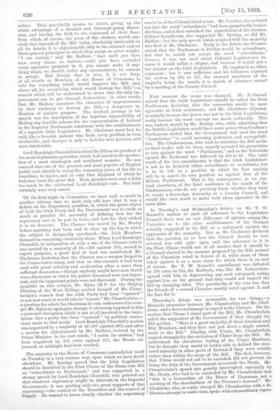Of the first night in Committee we have said so
much in another column that we need only add here that it was a debate on the Supremacy question, in which the great object of both the Irish Party and the Government was to evade as much as possible the necessity of defining how far the supremacy was to be put in force, and how far they wished it to lie dormant. The Closure was moved by Mr. Morley before anything had been said to clear up the fog in which the subject is designedly enveloped,—the Irish Members themselves remaining absolutely silent. When Lord Randolph Churchill, in indignation at such a use of the Closure (which was carried by a majority of 48,-243 against 195), moved to report progress, a great deal of heat was manifested, Mr. Gladstone declaring that the Closure was a weapon forged in the Conservative camp, and that on this occasion it had been used with great sobriety and moderation after a more than sufficient discussion,—though anybody might have seen that it was a discussion in which the points discussed were not impor- tant, and the important points were not discussed. Daring the squabble on this subject, Mr. Byles (M.P. for the Shipley Division of the West Riding) availed himself of Mr. Cham- berlain's remark that the Irish Party had been " squared " to ask how much it would take to " square " Mr. Chamberlain,— a question for which the Chairman in vain endeavoured to com- pel Mr. Byles to apologise, though it obviously imputed to him a personal corruption which is not at all involved in the impu- tation that a party has been " squared " by political conces- sions made to that party. Lord Randolph Churchill's motion was negatived by a majority of 42 (307 against 265), and after a motion for adjournment by Mr. Balfour, resisted by the Prime Minister in the curt words, "I resist the motion," had been negatived by 304 votes against 257, the House ad- journed, as midnight had been reached.


































 Previous page
Previous page